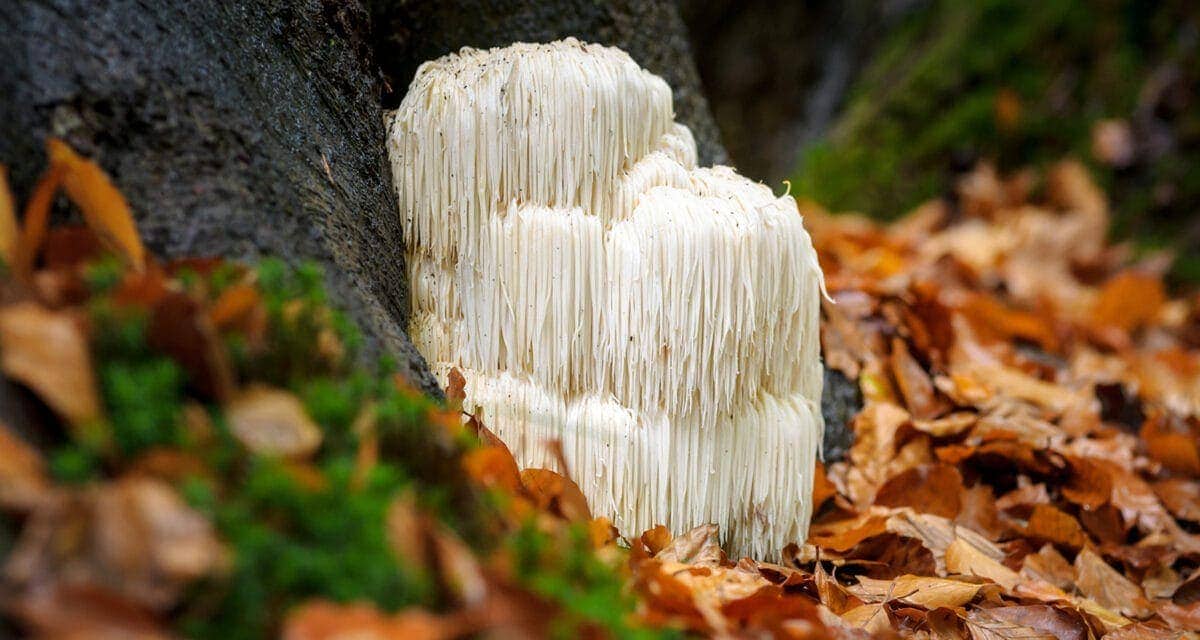This Post May Contain Affiliate Links. Please Read Our Disclosure Policy.
Lion’s mane is a mushroom full of amazing benefits! From its immune-boosting properties to its potential to fight dementia and Alzheimer’s, to its ability to lessen the symptoms of depression and anxiety, lion’s mane is a fungus that should definitely be on your radar.

What Is Lion’s Mane?
Lion’s mane is an edible mushroom native to North America, Europe, and Asia. They get their name from their long, thin spines, which resemble (you guessed it) a lion’s mane. They are especially common on beech trees and other hardwoods in the late summer and early autumn.
Health Benefits?
- Immunity booster
- Helps with depression and anxiety
- Helps manage diabetes
- Reduces inflammation
- May help repair damage to nerve cells
- Could help prevent dementia
Immunity Booster
Research on lion’s mane’s immunity-boosting properties in still in its early stages, but animal studies show that lion’s mane can improve the body’s intestinal immune system. This system helps prevent and fight illnesses that enter the body through the digestive system.
Helps with Depression and Anxiety
While only a very small amount of human research has been done, early animal research shows that lion’s mane can stimulate the hippocampus, the part of the brain that is responsible for processing of long-term memory and emotional responses. Its anti-inflammatory properties can also help with symptoms of depression.
Helps Manage Diabetes
Studies in mice show that even in small doses, lion’s mane can lower blood sugar. Besides causing blood sugar levels to be too high, diabetes can also cause nerve pain in the feets and hands. Lion’s mane has been shown to reduce that pain.
Reduces Inflammation
As an anti-inflammatory, lion’s mane can help reduce the impact of diseases caused by chronic inflammation, like heart disease, rheumatoid arthritis, and even cancer. They are especially helpful in inflammation-caused illnesses in the digestive system.
May Help Repair Damage to Nerve Cells
Research has shown that lion’s mane might be able to help grow and repair nerve cells. It may even be helpful to people who have suffered a stroke. However, research is still ongoing and there have thus far been no trials on humans.
Could Help Prevent Dementia
Studies have shown that lion’s mane contains several ingredients that can help grow new brain cells, something that declines as we age. Animal studies show that it decreases memory loss and may even prevent Alzheimer’s disease.
Other Lion’s Mane Benefits
- May help fight cancer
- Improves energy levels
- Good for heart health
- Full of antioxidants
- Good for preventing stomach ulcers
How Do I Take Lion’s Mane & What Should I Expect?
Lion’s mane does not taste very good, and while some people may recommend adding it to your coffee, there are no added benefits for ingesting it that way. Do yourself a favor and get a capsule or pill form and avoid that gross taste.
Side effects appear to be minimal, although some people report rashes or breathing problems after taking lion’s mane. This was more than likely due to an allergic reaction to lion’s mane.
Precautions
Talk to your doctor before starting any supplement or vitamin plan to make sure it’s a healthy choice for you. In particular, if any of the following apply to you:
- Allergic to mushrooms or fungi: Avoid lion’s mane since it is a mushroom.
- Pregnant or breastfeeding: There has not been enough research done on how lion’s mane affects people who are pregnant or breastfeeding, so it’s best to consult your medical professional prior to taking it.

More From Health & Wellness
- How I Beat Depression Naturally
- All About Astragalus
- All About Ashwagandha
- Dopamine Detox – What is It and How to Do It
- Immunity Boosters
- Immune System Booster Shot Recipe (Maximum Strength!)
- Self-Care When You’re Stuck Inside
- All About Cordyceps
- All About Adaptogens + How They Can Help You Perform, Sleep, and Feel Better
Hey – you’ve made it this far, and now we’re best friends! Make sure you follow me on Instagram, Pinterest, and Facebook, too!

















Never Miss A Meal!
New Recipes Straight To Your Inbox
A curated selection of our most recent recipes, delivered straight to your inbox once a week.
Thank you!
You have successfully joined our subscriber list.